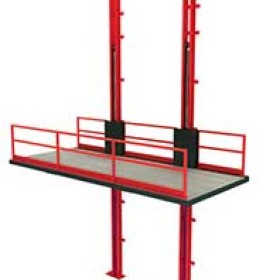Your business's freight elevator is a silent hero, carrying tons of loads every day, ensuring the smooth operation of your operations. However, like any machine, freight elevators wear out over time and require regular maintenance. Periodic freight elevator maintenance isn't just a recommendation; it's a legal requirement under the "Health and Safety Conditions in the Use of Work Equipment Regulation."
Why is Periodic Maintenance Mandatory and Vital?
- Life and Property Safety: This is the most important reason. A poorly maintained elevator risks failure in many critical parts, from brake systems to hydraulic hoses. This poses a life-threatening risk to your employees and can damage the valuable goods you carry.
- Legal Responsibility: According to the regulation, the building manager is responsible for ensuring the safe operation of the elevator and conducting periodic inspections. In the event of an accident, detecting a lack of regular maintenance can lead to serious legal and criminal penalties.
- Reducing Failure Costs: "Preventive maintenance" is always less expensive than "repairative maintenance." A minor wear and tear or leak detected during regular inspections can be fixed at very low cost. However, if this minor issue is ignored, it can turn into a major and expensive failure that can halt the entire system.
- Uninterrupted Operation: An unplanned elevator malfunction can halt your entire production or logistics flow, resulting in lost production and delays. Regular maintenance ensures business continuity by ensuring your elevator is always operational.
Legal Process: How Often Should Periodic Inspection Be Performed?
- Green Tag: Indicates that the elevator is completely safe and suitable.
- Blue Tag: Indicates that there are minor defects, but these defects must be corrected before the next periodic inspection.
- Red Tag: Indicates that the elevator is dangerous to use and must be removed from service until the detected deficiencies are corrected.
What Is Checked During a Comprehensive Periodic Maintenance?
- Mechanical Components: Ropes, chains, pulleys, guide rails, and wheels are checked for wear, looseness, or deformation.
- Hydraulic System (if applicable): Oil level and quality, hoses, seals, and pressure settings are checked. Potential leaks are identified.
- Electrical and Control Panel: The functionality of cable connections, fuses, contactors, and control buttons is tested.
- Safety Equipment: All safety components, such as overload sensors, emergency stop buttons, door safety switches, parachute braking systems, and hose burst valves, are meticulously tested for proper operation.
- General Cleaning and Lubrication: Moving parts are lubricated with the manufacturer's recommended lubricants, and areas such as the pit bottom are cleaned of accumulated dust and debris.
Don't Neglect Maintenance, Eliminate Risk
Periodic maintenance of your freight elevator is not a task that can be postponed or ignored. It is both a legal obligation and a wise investment in the safety and efficiency of your business. At Izmir Demir Lift, we are at your service not only in production but also in after-sales service. Our expert technical team meticulously performs periodic maintenance of your elevators, ensuring you meet all legal requirements and your operations continue uninterrupted.
We wish you healthy and productive work.
Izmir Demir Lift
